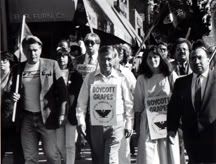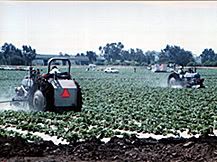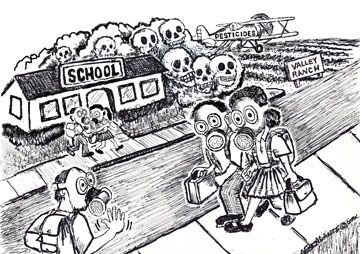Rep. Elton Gallegly is the Chair of the House Subcommittee on Immigration. He’s also one of the most egregiously anti-immigrant leaders in Congress, pushing a strategy to force a mass deportation, cleverly couched as “attrition through enforcement.”
Unfortunately, Gallegly’s zeal to get tough on immigrants would have profound consequences for California and the rest of the United States.
California’s agriculture and food production are the envy of the world. The state’s farmers not only help feed the world, but keep prices low and jobs here in the United States. Yet this great agricultural machine is under assault by one of California’s own members of Congress: Elton Gallegly. Instead of embracing the business-labor compromise bill known as AgJOBS that would legalize farm workers and make changes to the H-2A guest worker program, Gallegly is trying to divide the business community from labor leaders and destabilize the agriculture industry in the process.
Gallegly has already held hearings that tried to pit Latinos against African Americans. (His hometown paper, the Ventura County Star, reported on March 1, 2011 “Immigration hearing turns into racial battle”) and designed to create tension between native-born citizens and naturalized citizens, which Rep. Xavier Becerra (CA-31) blasted as “scapegoating on steroids.”
Gallegly’s next hearing is titled, “The H-2A Visa Program – Meeting the Growing Needs of American Agriculture?” His approach is to insist that the solution to our farm labor crisis is an employer-friendly guest worker program, instead of the thoughtful, realistic, bipartisan approach embodied by AgJOBS that includes stronger labor rights for workers, changes to the visa program desired by employers, and a way for undocumented farm workers to earn legal status if they have worked in the agriculture industry.
Gallegly knows that California’s agriculture industry is dependent on a foreign-born and mostly unauthorized workforce. Yet, due to our broken immigration system, the foreign-born workers who comprise the overwhelming majority of our agricultural workers have few avenues to become legalized and, without them, farmers have few avenues to keep their farms operating at full capacity. It’s already bad enough. But, Gallegly is intent upon making a bad situation worse. Importing new workers through a revised H-2A program, and deporting the seasoned workers who have been here for years, is not the answer. A reasonable approach, like the AgJOBS legislation, is.
But the impact of Gallegly’s policy prescriptions will not just hurt agriculture.
Not too far north of Gallegly’s district lies another of California’s economic crown jewels: Silicon Valley. According to Tech Crunch, the U.S. immigration policies are having a devastating impact on entrepreneurship:
NBC Nightly News anchor Tom Brokaw visited Silicon Valley last month to meet immigrant entrepreneurs. At Microsoft’s Mountain View campus, he met with a dozen of them. More than half said that they might be forced to return to their home countries. That’s because they have the same visa issues that Kunal Bahl had. Unable to get a visa that would allow him to start a company after he graduated from Wharton in 2007, Kunal returned home to India. In February 2010, he started SnapDeal—India’s Groupon. Instead of creating hundreds of jobs in the U.S., Kunal ended up creating them in New Delhi.
At a time when our economy is stagnating, some American political leaders are working to keep the world’s best and brightest out. They mistakenly believe that skilled immigrants take American jobs away. The opposite is true: skilled immigrants start the majority of Silicon Valley startups; they create jobs.
Meanwhile, entrepreneurship is booming in countries that compete with us. And more than half a million doctors, scientists, researchers, and engineers in the U.S. are stuck in “immigration limbo”. They are on temporary work visas and are waiting for permanent-resident visas, which are in extremely short supply. These workers can’t start companies, justify buying houses, or grow deep roots in their communities. Once they get in line for a visa, they can’t even accept a promotion or change jobs. They could be required to leave the U.S. immediately—without notice—if their employer lays them off. Rather than live in constant fear and stagnate in their careers, many are returning home.
Constant fear is what Gallegly is instilling in immigrants across the economic spectrum.
California’s economy, from Silicon Valley to the Central Valley and much of the rest of the state, relies on the labor of immigrants. And, it’s no secret that California’s economy is already in a precarious state. A report from the Immigration Policy Center documented the positive economic effect immigrants have on the state:
A 2008 study by the California Immigrant Policy Center concludes that immigrants in California pay roughly $30 billion in federal taxes, $5.2 billion in state income taxes, and $4.6 billion in sales taxes each year. In California, “the average immigrant-headed household contributes a net $2,679 annually to Social Security, which is $539 more than the average US-born household. Additionally, “immigrants are among California’s most productive entrepreneurs and have created jobs for tens of thousands of Californians. By 2000, immigrant owners of Silicon Valley companies had created 72,829 jobs and generated more than $19.5 billion in sales.”
A report from the Congressional Budget Office, The Role of Immigrants in the U.S. Labor Market: An Update, noted the major role of immigrants in California:
The foreign-born labor force is disproportionately located in certain states, and in those states, its members make up a substantial share of the total labor force. In 2009, 6 million of the 24 million foreign-born members of the labor force resided in California alone, and another 9 million lived in just five additional states—New York, Florida, Texas, New Jersey, and Illinois. A third of the labor force in California was foreign born, as was over a fifth of the labor force in the other five states. By comparison, in the remaining 44 states, the foreign born made up less than 10 percent of the labor force.
Instead of creating jobs, Gallegly is scaring workers with the threat of deportation. Instead of bolstering his state’s economy, Gallegly’s obsession with deporting immigrants or hiring replacement workers through an employer-friendly guest worker program could seriously damage it.
Cross-Posted at America's Voice.
 As we we celebrate Labor Day weekend, please remember that some workers are still not entitled to the 8 hour work day that many of us take for granted.
As we we celebrate Labor Day weekend, please remember that some workers are still not entitled to the 8 hour work day that many of us take for granted. 

 Despite this, the Bush Administration’s EPA registered methyl iodide nationally in 2007–automatically permitting this toxin for use in a number of states. Other states like California have their own state regulations and are still deciding whether to allow it to be used.
Despite this, the Bush Administration’s EPA registered methyl iodide nationally in 2007–automatically permitting this toxin for use in a number of states. Other states like California have their own state regulations and are still deciding whether to allow it to be used.

